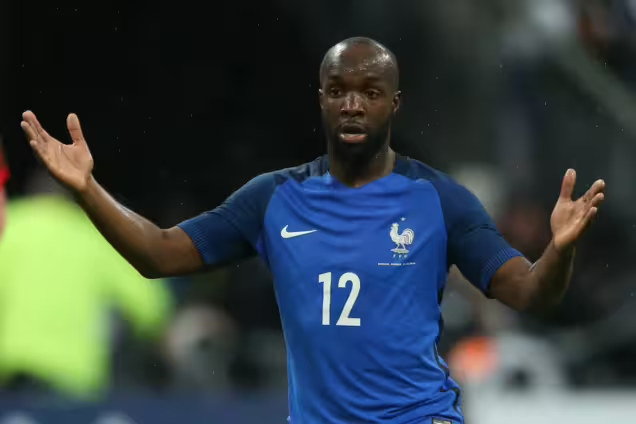Some of FIFA's rules on player transfers go against European Union laws and free movement principles, the EU's top court said on Friday in a ruling that could open the door for players to find a new club more easily after their contract is terminated.
FIFA's Regulations on the Status and Transfer of Players (RSTP) say a player who terminates a contract before its term "without just cause" is liable to pay compensation to the club, and where the player joins a new club they will be jointly liable for payment of compensation.
The Court of Justice of the European Union (CJEU), ruling on a high-profile case linked to former France player Lassana Diarra, stated these dispositions were unlawful, and the judgment is expected to prompt FIFA to revamp its transfer regulations.
"The rules in question are such as to impede the free movement of professional footballers wishing to develop their activity by going to work for a new club," said the Luxembourg-based CJEU.
"Those rules impose considerable legal risks, unforeseeable and potentially very high financial risks as well as major sporting risks on those players and clubs wishing to employ them which, taken together, are such as to impede international transfers of those players."
In 2014, Diarra left Lokomotiv Moscow one year into a four-year deal and the club took the matter to FIFA's Dispute Resolution Chamber (DRC), arguing he had breached the rules when his contract was terminated after the player decided to leave without just cause following a pay cut.
Diarra received an offer to join Belgian club Charleroi but the club backed out after FIFA refused to sign the International Transfer Certificate (ITC), preventing the player being registered with the Belgian federation.
According to the CJEU ruling, it is also unlawful to refuse to sign the ITC.
In 2015, FIFA ordered Diarra to pay 10 million euros ($11.05 million) in damages to Lokomotiv, prompting the former Chelsea, Arsenal and Real Madrid player to sue the world governing body and Belgian FA for damages before a local court.
The CJEU ruling could also lead other players affected by the FIFA regulations like Diarra was to also seek damages.
"All professional players have been affected by these illegal rules (in force since 2001) and can therefore now seek compensation for their losses," Diarra's lawyers Jean-Louis Dupont and Martin Hissel said in a statement.
"We are convinced that this 'price to pay' for violating EU law will - at last - force FIFA to submit to the EU rule of law and speed up the modernisation of governance."
'FIFA'S IMMUNITY IS OVER'
Dupont added that the whole transfer system will change with the court's ruling.
"FIFA's immunity is over, there will be a before and after in (football) governance after the EU (court) ruling," Dupont told Reuters.
FIFA said it was "satisfied that the legality of key principles of the transfer system have been re-confirmed in today's ruling. The ruling only puts in question two paragraphs of two articles of the FIFA Regulations on the Status and Transfer of Players, which the national court is now invited to consider.
"FIFA will analyse the decision in coordination with other stakeholders before commenting further," the soccer body added.
"On behalf of professional football players worldwide FIFPRO welcomes these (ECJ) findings," the international players' union said.
"The ECJ has just handed down a major ruling on the regulation of the labour market… which will change the landscape of professional football."
David Terrier, the president of FIFPRO Europe, said they were happy for Diarra but that he was not the only victim.
"The reality is we are going to see how to repair the damage for all the players who were victims of the (FIFA transfer) system," Terrier told Reuters.
REDUCED TRANSFER FEES?
The ruling could result in reduced transfer fees and more economic power for players, according to Ian Giles, the EMEA head of antitrust and competition at global law firm Norton Rose Fulbright.
"It's entirely possible this means players will feel they can now break contracts and sign on with new clubs, without the selling club being able to hold them or demand significant transfer fees," Giles said.
"But over time things will have to stabilise to allow clubs to remain economically viable. Smaller clubs who rely on transfer fees for talent they have developed may well be the losers in this context.
"In terms of free movement, the ECJ recognises that there may be a justification on public interest grounds to maintain the stability of playing squads, but considers the current rules go beyond what is necessary."
The European Club Association (ECA), which represents more than 700 clubs, was not immediately reachable for comment.
Latest Stories
-
Diplomatic Corps hail Bawumia’s integrity and leadership qualities
18 minutes -
To chocolate, Ghana’s pride by Bioko
37 minutes -
Chartered Institute of Bankers, Ghana, confers Honorary Fellow status on Victor Yaw Asante
59 minutes -
BoG marks end of year with Thanksgiving Service
1 hour -
Ghana’s Next Sports Minister: The Debate Begins
1 hour -
Election 2024: NPP advised to be mindful of the reasons being ascribed to their election lost
2 hours -
GNFS urges Ghanaians to prevent fires during yuletide
2 hours -
Report tobacco users who smoke publicly – FDA advises
2 hours -
Abdallah Ali-Nakyea elevated to Associate Professor at UG School of Law
3 hours -
Kick2build commissions 5 libraries in Klo Agogo, donates school supplies
3 hours -
Slim and Fit Ghana donates to kids at Motherly Love Orphanage in Kwabenya
3 hours -
We’ll be reorganising ourselves for the battles of tomorrow – NPP
3 hours -
Ghanaian teacher Morkporkpor Fiador’s GWR Read-A-Thon attempt postponed
3 hours -
Revocation of licences of UT, Capital banks were strict requirements from IMF – Dr. Addison
3 hours -
MP Cynthia Morrison among 280 members expelled by Agona West NPP
3 hours

